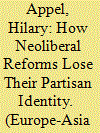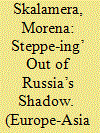| Srl | Item |
| 1 |
ID:
161372


|
|
|
|
|
| Summary/Abstract |
In the post-communist world, the flat tax was a popular neoliberal fiscal reform that initially spread through dense networks of rightwing politicians and parties. Over time, its symbolism and appeal broadened, making this specific fiscal approach attractive to a wider range of actors and regimes. By considering the full set of post-communist flat tax cases and the competitive dynamics in the region, this article examines the evolution of this reform and demonstrates how the structure and the symbolism of the flat tax offered advantages to governments that eventually transcended regime type and partisanship.
|
|
|
|
|
|
|
|
|
|
|
|
|
|
|
|
| 2 |
ID:
188294


|
|
|
|
|
| Summary/Abstract |
The Russian invasion of Ukraine in February 2022 has caused a massive humanitarian crisis. As of this writing, thousands of people have lost their lives, and many more seem destined to die. Moreover, nearly 2.5 million Ukrainians have fled their country, a number that will grow considerably if the war continues. Beyond the human suffering and misery it entails, the conflict has shaken the foundations of Europe’s security order. Western governments have scrambled to ramp up their defensive expenditures, imposed severe economic and political sanctions on Russia, and upped their supply of weapons to Ukraine. The Kremlin, in turn, has shown no signs of backing down. On the contrary, the Putin government has issued thinly veiled nuclear threats and warned Western leaders not to impose a no-fly zone over Ukraine. Though it is still too early to know how the conflict will end, it is already clear that Europe will not be the same after the war. How could this happen?
|
|
|
|
|
|
|
|
|
|
|
|
|
|
|
|
| 3 |
ID:
188299


|
|
|
|
|
| Summary/Abstract |
This essay analyses the evolving character of Russia’s energy relationships in the post-Soviet space by looking at the Caucasus and Central Asia. In the past, due to the historic legacy of Russia-controlled pipelines, Moscow was able to exert influence by manipulating structural asymmetries in regional natural gas value chains. This has changed with China’s entry as the region’s major market alternative and the breakthroughs of the global energy transition. The initial phase of Russia’s declining ‘energy power’ vis-à-vis China in Central Asia came to an end as the Crimea crisis was unfolding, an event that has drastically changed the risk perception of Russian gas in Europe, setting off a chain of consequences that led to a re-evaluation of Russia’s energy power in post-Soviet Eurasia. The essay also shows, however, that Russia maintains influence in post-Soviet Eurasia through inter-elite networks and shared concerns among hydrocarbon-exporting countries about the energy transition.
|
|
|
|
|
|
|
|
|
|
|
|
|
|
|
|